20 Jun 2018 | News, Volume 47.02 Summer 2018
[vc_row][vc_column][vc_custom_heading text=”Crime writers have less to lose than travel writers in describing the underside of holiday spots, argues Rachael Jolley in the summer 2018 issue of Index on Censorship magazine.” google_fonts=”font_family:Libre%20Baskerville%3Aregular%2Citalic%2C700|font_style:400%20italic%3A400%3Aitalic”][vc_single_image image=”101057″ img_size=”full” add_caption=”yes”][vc_column_text]
When you read a novel, it takes you on a journey to a different time or place. Being an avid reader of crime fiction, my early journeys to Chicago were in the company of Sara Paretsky. I walked the streets with her VI Warshawski. We shot down North Michigan Avenue and headed out to Wrigley Field for the fifth inning. Chicago opened up to me in those books – not always gloriously.
Donna Leon showed me around the small islands of the Venetian Lagoon and Ian Rankin has taken me on numerous tours of the dark closes of Edinburgh, as well as its swankier New Town.
Crime writers have less to lose than many other authors in describing the underside of the cities. After all, their readers don’t expect a fairytale, and their escapism is a different kind from the happy-ever-afters of the perfect beach-read.
Perhaps we get more accurate portrayals of cities or countries by crime writers than in guidebooks or from travel apps.
Take Mexico and the Maldives, for instance. These are sexy holiday destinations, popular with everyone from honeymooners to scuba divers. But when thousands of holidaymakers are packing their sunscreen and swimsuits, do they know of the catastrophic numbers of journalists killed in Mexico in the past few years? Or how journalists in the Maldives are fleeing in fear of their lives?
Ad-hoc, non-scientific research, through the medium of asking friends and family, suggests not. And when that information is received, it is with some shock.
[/vc_column_text][/vc_column][/vc_row][vc_row][vc_column width=”1/4″][vc_icon icon_fontawesome=”fa fa-quote-left” color=”custom” align=”right” custom_color=”#dd3333″][/vc_column][vc_column width=”3/4″][vc_custom_heading text=”The results are stark. Many top tourism destinations do terribly on freedom of expression.” google_fonts=”font_family:Libre%20Baskerville%3Aregular%2Citalic%2C700|font_style:400%20italic%3A400%3Aitalic”][/vc_column][/vc_row][vc_row][vc_column][vc_column_text]
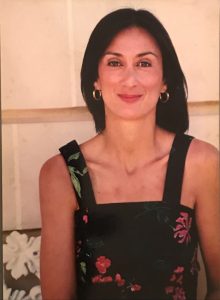
The other side: Maltese journalist Daphne Caruana Galizia was murdered on 16 October 2017
Mexico is ranked 147th out of 180 in the 2018 Reporters Without Borders World Press Freedom Index, down from 75th in 2002. During this period, tourist numbers have continued to go up. Meanwhile, 4.6% of the government’s annual spend continues to go on tourism, significantly more than is spent in Brazil and New Zealand, for instance.
Travel and tourism delivers 6.9% of Mexico’s GDP, compared with 3.3% of Brazil’s and 5.1% of New Zealand’s. No wonder, then, that Mexico’s government is prepared to invest in tourism, and to keep that tap firmly switched on.
Informed tourists could be a powerful pressure point on governments that have been practising repression of those voices raised in criticism, or that don’t bother to pursue the criminals who threaten or kill those voicing dissent.
At this year’s Hay Festival, I was on a panel with Paul Caruana Galizia, son of the murdered journalist Daphne, as well as Malta journalist Caroline Muscat of The Shift News, and BBC Europe editor Katya Adler. Paul talked about his mother’s work, the pressures she was under and how she pursued her investigations. We discussed the wider situation in Malta, where 34 libel cases against Daphne have, since her death, rolled over to the rest of the family. During the question and answer session, some members of the audience said they had no idea about what was going on in Malta, even though they went there on holiday, and asked what they could do to help.
Paul suggested that anyone holidaying on the Mediterranean island might mention being aware of the case to local people they met. The island was dependent on tourism, and if the Maltese felt this could be affected there would be more pressure on the government to alter its attitude, and legislation, on media freedom.
He also believed the Maltese government was much more worried about international attitudes than local ones.
In places where freedom of expression is under pressure – and Malta, the Maldives and Mexico are just a few of them – tourism is often a valuable asset. So visitors who are aware of the wider situation could be advocates for change.
According to analysis of travel, tourism, financial and freedom-of-expression data carried out for Index on Censorship magazine by Mark Frary, there are indications that some tourists want to know more than whether or not a destination has a good beach before they head off on holiday.
Data on travel patterns suggest that travellers also “reward” destinations that change legislation or the environment, his analysis suggests, with Argentina picking up significant tourist numbers after it became the first South American country to make gay marriage legal.
In this issue, we have asked reporters around the world to dig into the details of popular holiday destinations to look at their records on freedoms, such as the right to protest, the right to debate and freedom of the media. The results are stark. Many top tourism destinations do terribly on freedom of expression.
In post civil war Sri Lanka, there was a period of hope after the election of Prime Minister Maithripala Sirisena in 2015. Many hoped that this beautiful island could have a future that was less violent, more equal and more open. Those hopes are now looking tarnished. As Meera Selva reports for the magazine, the country’s tourist numbers grew spectacularly in 2017. But while tourists flocked in, the great improvement was not going as well as Sri Lankans had wished.
The prime minister has reactivated the Press Council – a body with the power to imprison journalists – and civil rights activists report threats against them. In this potential Eden, the garden is not as green and pleasant as predicted.
Pretty beach paradise Baja California Sur is a popular holiday destination, particularly for Americans. But not many will know that it also has the second-highest murder rate in Mexico, behind the western state of Colima, according to government data. The dangers of being an investigative journalist there are particularly high, with some living under 24-hour protection, as Stephen Woodman reports in the magazine. Again, this is a place where many (probably most) tourists are unaware of the fuller picture of the place where they are happily enjoying the sunshine.
As someone with a heritage collection of guidebooks from publishers including Lonely Planet, Rough Guides and Footprint, it is easy for me to flick through the pages and see that those guides have made a fair effort to inform readers on questions of human rights, politics and safety in the past.
But guidebooks are carried by far fewer travellers these days. According to the Financial Times, from 2005 to 2014, 9% fewer travellers left the UK but guidebook sales fell by 45%.
With most people looking to the web for all their holiday information, are they finding themselves as well-informed as they would have been with a well-thumbed book under their arm?
An April 2018 travel section article about Malta’s capital Valletta on The Guardian’s website doesn’t mention the politics or human rights record of the island. Nor, as far as I could find, did the Lonely Planet website section on Malta. While, of course, it would be possible to find news about those issues on different parts of The Guardian site, or elsewhere on the web, it’s certainly not connecting the dots for travellers.
With the printed travel sections of newspapers under pressure from advertisers – and far smaller than they were a decade ago – there is little space to create in-depth reports, and travel articles that include gritty details as well as the delights seem few and far between.
At the upcoming Index magazine launch and summer party on 4 July, our panel of experts will discuss what responsibility authors might have to tell their readers about the good, the bad and the ugly sides of any destination. It should be an interesting evening, chaired by BBC World reporter Vicky Baker, who also writes for Guardian Travel. If you would like to join us, email [email protected] to grab a free ticket.
And since we are just back from the Hay Festival, we can also recommend our special Hay Festival podcast, where deputy editor Jemimah Steinfeld chats to three authors about taboos. Catch it on Soundcloud.com/indexmagazine.
Finally, don’t miss our regular quarterly magazine podcast, also on Soundcloud, including an interview with the founder of the Rough Guides, Mark Ellingham. Come by and visit us.
The latest issue of Index on Censorship magazine, Trouble in Paradise, Escape from Reality: what holidaymakers don’t know about their destinations is out now. Buy a subscription. Buy a print copy from bookshops including BFI, Serpentine and MagCulture (London), News from Nowhere (Liverpool), Home (Manchester), and Red Lion Books (Colchester), or via Amazon. Digital versions available via exacteditions.com or iTunes.
[/vc_column_text][/vc_column][/vc_row][vc_row content_placement=”top”][vc_column width=”1/3″][vc_custom_heading text=”Trouble in paradise” font_container=”tag:p|font_size:24|text_align:left” link=”url:https%3A%2F%2Fwww.indexoncensorship.org%2F2018%2F06%2Ftrouble-in-paradise%2F|||”][vc_column_text]The summer 2018 issue of Index on Censorship magazine takes a special look at how holidaymakers’ images of palm-fringed beaches and crystal clear waters contrast with the reality of freedoms under threat
With: Ian Rankin, Victoria Hislop, Maria Ressa [/vc_column_text][/vc_column][vc_column width=”1/3″][vc_single_image image=”100776″ img_size=”medium” alignment=”center” onclick=”custom_link” link=”https://www.indexoncensorship.org/2018/06/trouble-in-paradise/”][/vc_column][vc_column width=”1/3″ css=”.vc_custom_1481888488328{padding-bottom: 50px !important;}”][vc_custom_heading text=”Subscribe” font_container=”tag:p|font_size:24|text_align:left” link=”url:https%3A%2F%2Fwww.indexoncensorship.org%2Fsubscribe%2F|||”][vc_column_text]In print, online. In your mailbox, on your iPad.
Subscription options from £18 or just £1.49 in the App Store for a digital issue.
Every subscriber helps support Index on Censorship’s projects around the world.
 SUBSCRIBE NOW[/vc_column_text][/vc_column][/vc_row]
SUBSCRIBE NOW[/vc_column_text][/vc_column][/vc_row]
14 Jun 2018 | News, Volume 47.02 Summer 2018 Extras
[vc_row][vc_column][vc_column_text][/vc_column_text][/vc_column][/vc_row][vc_row][vc_column][vc_column_text]
The summer 2018 issue of Index on Censorship magazine takes you on holiday, just a different kind of holiday. From Malta to the Maldives, we explore how freedom of expression is under attack in dream destinations around the world.
In this podcast, we speak with co-founder of Rough Guides travel guidebooks Mark Ellingham about the questions that arise when publishing a travel guide, journalist Stephen Woodman talks about one of Mexico’s top destination’s dangers and Index correspondent Silvia Nortes discusses how a drag queen’s performance was investigated by Canary Islands prosecutors for a possible religious offence.
Print copies of the magazine are available on Amazon, or you can take out a digital subscription via Exact Editions. Copies are also available at the BFI, the Serpentine Gallery and MagCulture (all London), News from Nowhere (Liverpool) and Home (Manchester). Each magazine sale helps Index on Censorship continue its fight for free expression worldwide.
[/vc_column_text][/vc_column][/vc_row][vc_row][vc_column width=”1/3″][vc_custom_heading text=”Trouble in Paradise”][vc_column_text]The summer 2018 issue of Index on Censorship magazine takes you on holiday, just a different kind of holiday. From Malta to the Maldives, we explore how freedom of expression is under attack in dream destinations around the world.
With: Martin Rowson, Jon Savage, Jonathan Tel [/vc_column_text][/vc_column][vc_column width=”1/3″][vc_single_image image=”100776″ img_size=”medium”][/vc_column][vc_column width=”1/3″][vc_custom_heading text=”Subscribe”][vc_column_text]In print, online. In your mailbox, on your iPad.
Subscription options from £18 or just £1.49 in the App Store for a digital issue.
Every subscriber helps support Index on Censorship’s projects around the world.
 SUBSCRIBE NOW[/vc_column_text][/vc_column][/vc_row]
SUBSCRIBE NOW[/vc_column_text][/vc_column][/vc_row]
23 Apr 2018 | Press Releases
A public art project and website celebrating dissent in Cuba and a collective of young bloggers and web activists who give voice to the opinions of young people from all over the Democratic Republic of Congo are among the winners of the 2018 Index on Censorship Freedom of Expression Awards.
The winners, who were announced on Thursday evening at a gala ceremony in London, also include one of the only human rights organisations still operating in Egypt and an investigative journalist from Honduras who regularly risks her life for her right to report on what is happening in the country.
Awards were presented in four categories: arts, campaigning, digital activism and journalism.
The winners are: Cuban art collective The Museum of Dissidence (arts); the Egyptian Commission for Rights and Freedoms (campaigning); Habari RDC, a collective of young Congolese bloggers and activists (digital activism); and Honduran investigative journalist Wendy Funes (journalism).
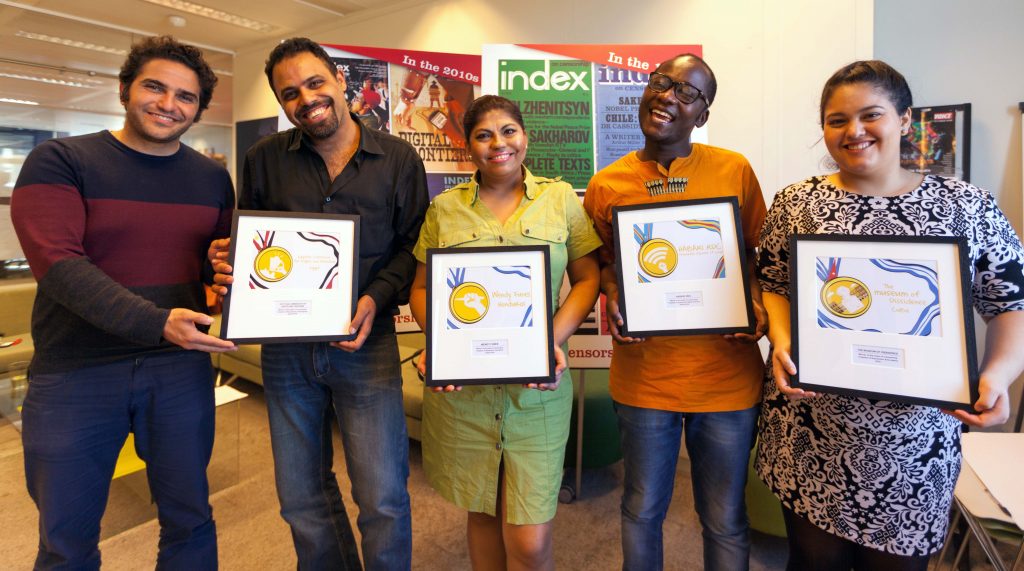
From right: Human rights defenders Mohamed Sameh and Ahmad Abdallah of 2018 Freedom of Expression Campaigning Award-winning Egypt Commission on Rights and Freedoms; 2018 Freedom of Expression Journalism Award-winning Honduran investigative journalist Wendy Funes; Congolese digital activist Guy Muyembe of 2018 Freedom of Expression Digital Activism Award-winning Habari RDC; Perla Hinojosa, Fellowship and Advocacy Officer at Index on Censorship, holds the 2018 Freedom of Expression Arts Award for Cuban arts collective Museum of Dissidence, who could not attend the Freedom of Expression Awards. (Photo: Index on Censorship)
“These winners deserve global recognition for their amazing work,” said Index on Censorship CEO Jodie Ginsberg. “Like all those nominated, they brave massive personal and political hurdles simply so that others can express themselves freely.”
Drawn from more than 400 public nominations, the winners were presented with their awards at a ceremony at The Mayfair Hotel, London, hosted by “stand-up poet” Kate Fox.
Actors, writers and musicians were among those celebrating with the winners. The guest list included The Times columnist and Chair of Index David Aaronovitch, BBC presenter Jonathan Dimbleby, comedian Shazia Mirza, social human rights activists Nimco Ali and Sara Khan, Serpentine Galleries CEO Yana Peel, poet Sabrina Mahfouz, Channel 4’s Lindsey Hilsum and more.
Winners were presented with cartoons created by Khalid Albaih, a Romanian-born Sudanese social media based political cartoonist who considers himself a virtual revolutionist.
Each of the award winners will become part of the fourth cohort of Freedom of Expression Awards fellows. They join last year’s winners — Chinese political cartoonist Rebel Pepper (arts); Russian human rights activist Ildar Dadin (campaigning); Digital collective Turkey Blocks (digital activism); news outlet Maldives Independent and its former editor Zaheena Rasheed (journalism) — as part of a world-class network of campaigners, activists and artists sharing best practices on tackling censorship threats internationally.
Through the fellowship, Index works with the winners – both during an intensive week in London and the rest of the awarding year – to provide longer term, structured support. The goal is to help winners maximise their impact, broaden their support and ensure they can continue to excel at fighting free expression threats on the ground.
This year’s panel of judges included Razia Iqbal, a journalist for BBC News, Tim Moloney QC, deputy head of Doughty Street Chambers, Yana Peel, CEO of the Serpentine Galleries, and Eben Upton CBE, a founder of the Raspberry Pi Foundation and CEO of Raspberry Pi.
Awards judge Eben Upton said: “”The ability to speak freely is a key foundation of democratic society and the rule of law: absent the ability to openly identify the abuse of power, extractive economic conditions, and exclusive political institutions, proliferate. This is why freedom of expression is so precious, and so often under attack from those in power.”
This is the 18th year of the Freedom of Expression Awards. Former winners include activist Malala Yousafzai, cartoonist Ali Ferzat, journalists Anna Politkovskaya and Fergal Keane, and Bahrain Center for Human Rights.
Ziyad Marar, President of Global Publishing at SAGE said: “The protection and promotion of free speech is a belief firmly entrenched within our values at SAGE. As both publisher of the magazine and sponsors of tonight’s awards, we are proud to support Index in their mission as they defend this right globally. We offer our warmest congratulations to those recognised and remain both humbled and awed by their inspirational achievements.”
Further details about the award winners are below.
For interviews with the award winners, who are in London until Friday 20 April, please contact Sean Gallagher at [email protected].
Photographs and other content related to the awards night will be available beginning 11am on Friday 20 April. Please contact Sean Gallagher at [email protected].
Index on Censorship is grateful for the support of the 2018 Freedom of Expression Awards sponsors: SAGE Publishing, Google, Private Internet Access, Edwardian Hotels, Vodafone, Vice News, Doughty Street Chambers and former Index Award-winning Psiphon.
Index on Censorship Freedom of Expression Awards 2018 – background on winners
Arts – The Museum of Dissidence (Cuba)
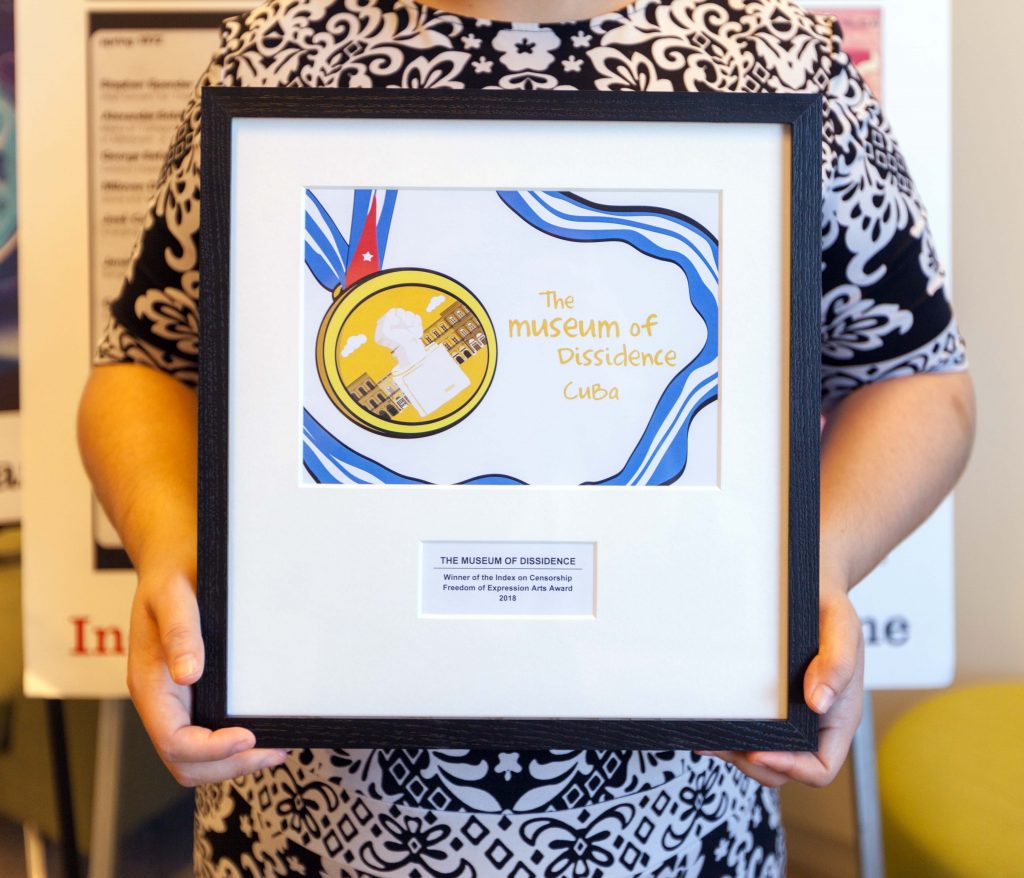
Perla Hinojosa, Fellowship and Advocacy Officer at Index on Censorship, holds the 2018 Freedom of Expression Arts Award for Cuban arts collective Museum of Dissidence, who could not attend the Freedom of Expression Awards. (Photo: Index on Censorship)
The Museum of Dissidence is a public art project and website celebrating dissent in Cuba. Set up in 2016 by acclaimed artist Luis Manuel Otero Alcántara and curator Yanelys Nuñez Leyva, their aim is to reclaim the word “dissident” and give it a positive meaning in Cuba. The museum organises radical public art projects and installations, concentrated in the poorer districts of Havana. Their fearlessness in opening dialogues and inhabiting public space has led to fierce repercussions: Nuñez was sacked from her job and Otero arrested and threatened with prison for being a “counter-revolutionary.” Despite this, they persist in challenging Cuba’s restrictions on expression.
CEO of Serpentine Galleries and 2018 Freedom of Expression Award judge Yana Peel said: The Museum of Dissidence in Cuba is incredibly important for the safe space that it is providing for unsafe ideas. It is a tremendous platform through which the great artists of Cuba bring Cuba to the global stage.”
Profile
Campaigning – The Egyptian Commission for Rights and Freedoms (Egypt). Award supported by Doughty Street Chambers
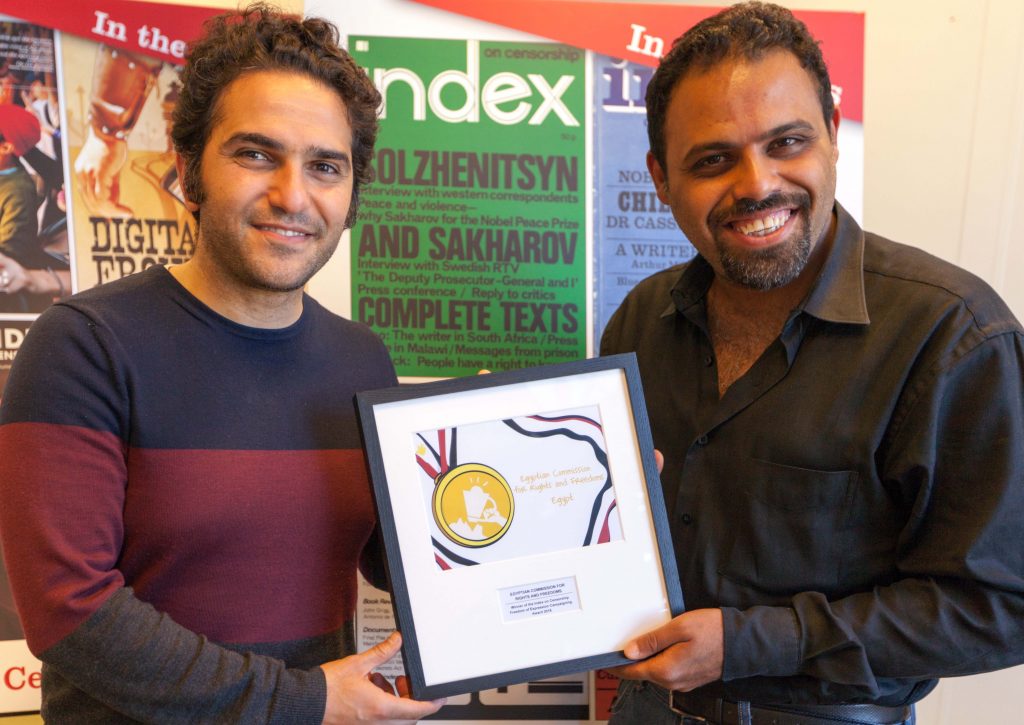
Human rights defenders Mohamed Sameh and Ahmad Abdallah of 2018 Freedom of Expression Campaigning Award-winning Egypt Commission on Rights and Freedoms. (Photo: Index on Censorship)
The Egyptian Commission for Rights and Freedoms is one of the few human rights organisations still operating in a country which has waged an orchestrated campaign against independent civil society groups. Egypt is becoming increasingly hostile to dissent, but ECRF continues to provide advocacy, legal support and campaign coordination, drawing attention to the many ongoing human rights abuses under the autocratic rule of President Abdel Fattah-el-Sisi. Their work has seen them subject to state harassment, their headquarters have been raided and staff members arrested. ECRF are committed to carrying on with their work regardless of the challenges.
CEO of Raspberry Pi and Freedom of Expression Awards 2018 judge Eben Upton said: “In an environment when organisations have had to step back or disappear altogether, they’ve managed to keep going and just that persistence over a period of time in a difficult environment is inspiring”.
Profile
Digital Activism – Habari RDC (Congo). Award sponsored by Private Internet Access
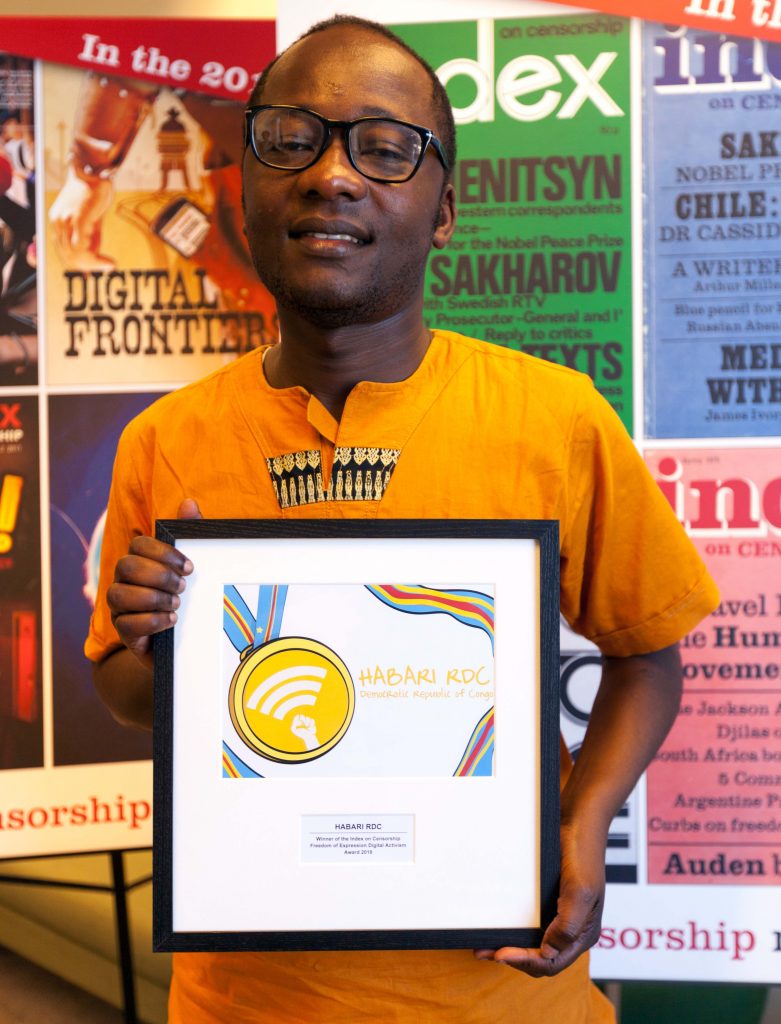
Congolese digital activist Guy Muyembe of 2018 Freedom of Expression Digital Activism Award-winning Habari RDC (Photo: Index on Censorship)
Launched in 2016, Habari RDC is a collective of more than 100 young Congolese bloggers and web activists, who use Facebook, Twitter and YouTube to give voice to the opinions of young people from all over the Democratic Republic of Congo. Their site posts stories and cartoons about politics, but it also covers football, the arts and subjects such as domestic violence, child exploitation, the female orgasm and sexual harassment at work. Habari RDC offers a distinctive collection of funny, angry and modern Congolese voices, who are demanding to be heard.
Journalist and 2018 Freedom of Expression Awards judge Razia Iqbal aid: “They’re doing something which is actually very hard to do, which is make sure that the future generation know what’s happening in their own country, are willing to speak to each other about it and be active politically”.
Profile
Journalism – Wendy Funes (Honduras). Award sponsored by VICE News
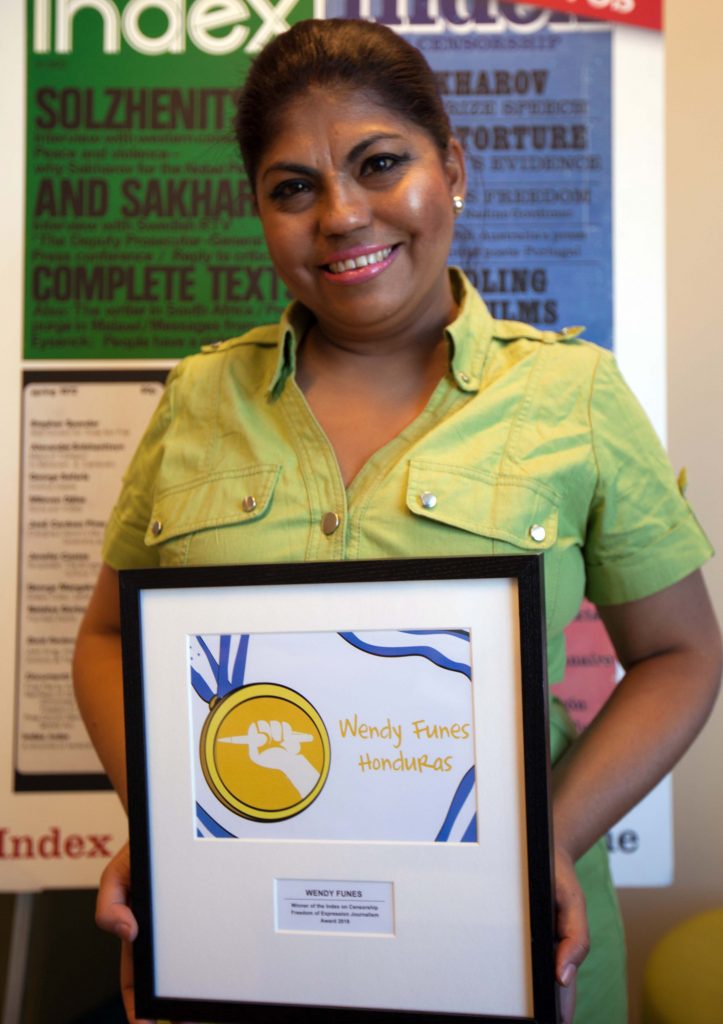
2018 Freedom of Expression Journalism Award-winning Honduran investigative journalist Wendy Funes. (Photo: Index on Censorship)
Wendy Funes is an investigative journalist from Honduras who regularly risks her life for her right to report on what is happening in the country, an extremely harsh environment for reporters. Two journalists were murdered in 2017 and her father and friends are among those who have met violent deaths in the country – killings for which no one has ever been brought to justice. Funes meets these challenges with creativity and determination. For one article she had her own death certificate issued to highlight corruption. Funes also writes about violence against women, a huge problem in Honduras where one woman is killed every 16 hours.
Journalist and 2018 Freedom of Expression Awards judge Razia Iqbal QC said: “She is courageous in the face of death threats. She is courageous in the face of censorship. She is courageous just in terms of getting up every morning and saying I’m going to continue to do what I am doing.”
Profile
ABOUT THE FREEDOM OF EXPRESSION AWARDS AND FELLOWSHIP
The Index on Censorship Freedom of Expression Awards recognise those individuals and groups making the greatest impact in tackling censorship worldwide. Established 18 years ago, the awards shine a light on work being undertaken in defence of free expression globally. Often these stories go unnoticed or are ignored by the mainstream press. Through the fellowship, Index works with the winners – both during an intensive week in London and the rest of the awarding year – to provide longer term, structured support. The goal is to help winners maximise their impact, broaden their support and ensure they can continue to excel at fighting free expression threats on the ground.
ABOUT INDEX ON CENSORSHIP
Index on Censorship is a UK-based nonprofit that campaigns against censorship and promotes free expression worldwide. Founded in 1972, Index has published some of the world’s leading writers and artists in its award-winning quarterly magazine, including Nadine Gordimer, Mario Vargas Llosa, Samuel Beckett and Kurt Vonnegut. Index promotes debate, monitors threats to free speech and supports individuals through its annual awards and fellowship program.
19 Apr 2018 | Awards, Cuba, Fellowship, Fellowship 2018
[vc_row][vc_column][vc_video link=”https://youtu.be/-UpVto-2Sf0″][vc_column_text]

Perla Hinojosa, Fellowship and Advocacy Officer at Index on Censorship, holds the 2018 Freedom of Expression Arts Award for Cuban arts collective Museum of Dissidence, who could not attend the Freedom of Expression Awards. (Photo: Index on Censorship)
Luis Manuel Otero Alcántara: First of all I would like to thank Index and everyone for being here. We had to do this via video because the bureaucracy, the embassies and the powers that be prevented us from being here to accept the award. It’s sad, because we would have liked to share this moment with all of you and the happiness that we feel receiving this award. This award for us means a lot but it also means a lot to all the artists who have preceded us and who are the reason why we have been able to work with a little bit more freedom and a little less fear. Antonia Eiriz, Tania Bruguera, Danilo Maldonado, Angel Delgado and all the artists who have suffered a lack of freedom of expression and creative freedom and who in one way or the other have never given up and have fought for their rights.
Yanelys Nuñez Leyva: On my part, I am happy because this is a boost, where the work of the museum is recognised internationally. This is not the work of just two people, it’s the work of a big collective. There’s a lot of artists but also many activists who are involved in the projects of the Museum of Dissidence. And for us, this is a recognition for them as well.
Luis Manuel: Freedom of expression is an integral part of all societies. It’s what allows us to question all the processes that can happen to an individual. From being able to tell a mother that her way of bringing up her children in a certain way is aggressive or not. To being able to say a political system is corrupt. To being able to express yourself to another person without facing violence or repression.
Yanelys: For me, freedom of expression is like breathing and being able to move every day. It’s something natural that enables us to improve ourselves and grow.
Luis Manuel: Freedom of expression also promotes love towards yourself, towards other people and all the people around you.[/vc_column_text][/vc_column][/vc_row][vc_row disable_element=”yes”][vc_column width=”1/2″][vc_single_image image=”84882″ img_size=”full” alignment=”center”][vc_column_text]
For his one-man protests, Ildar Dadin was sent to prison in December 2015 where he was tortured, before his conviction was quashed in February 2017. Read the full profile.[/vc_column_text][/vc_column][vc_column width=”1/2″][vc_single_image image=”84888″ img_size=”full” alignment=”center”][vc_column_text]
Despite the persecution he faces for his work, Rebel Pepper continues to satirise the Chinese state from a life in exile in Japan. Read the full profile
[/vc_column_text][/vc_column][/vc_row][vc_row disable_element=”yes”][vc_column width=”1/2″][vc_single_image image=”84889″ img_size=”full” alignment=”center”][vc_column_text]
Established in 2015, Turkey Blocks is an independent digital research organisation that monitors internet access restrictions in Turkey. Read the full profile.
[/vc_column_text][/vc_column][vc_column width=”1/2″][vc_single_image image=”84887″ img_size=”full” alignment=”center”][vc_column_text]
Maldives Independent, the Maldives’ premiere English publication and one of the few remaining independent media outlets, was formed in exile in Sri Lanka in 2004. Read the full profile.
[/vc_column_text][/vc_column][/vc_row][vc_row][vc_column][vc_basic_grid post_type=”post” max_items=”12″ style=”load-more” items_per_page=”4″ element_width=”6″ grid_id=”vc_gid:1524235545550-0aab9a14-081b-8″ taxonomies=”8935″][/vc_column][/vc_row]

![]() SUBSCRIBE NOW[/vc_column_text][/vc_column][/vc_row]
SUBSCRIBE NOW[/vc_column_text][/vc_column][/vc_row]




